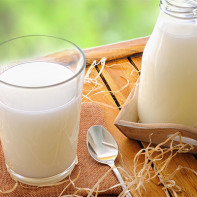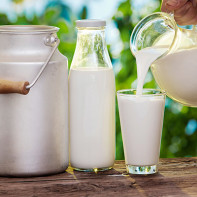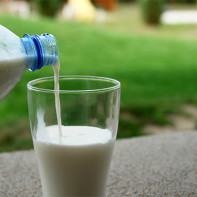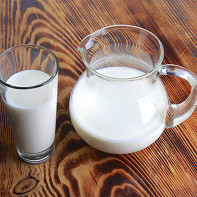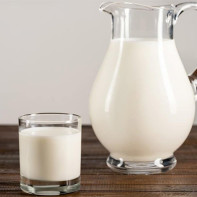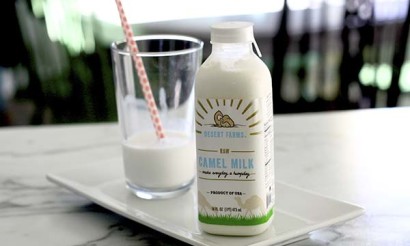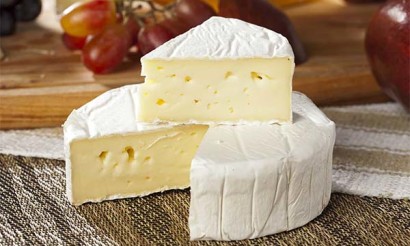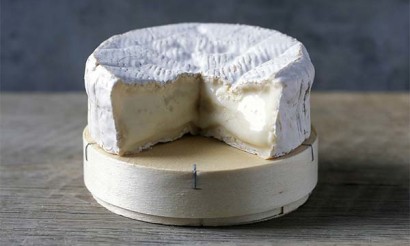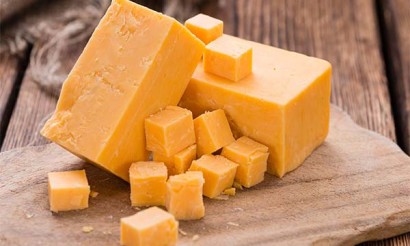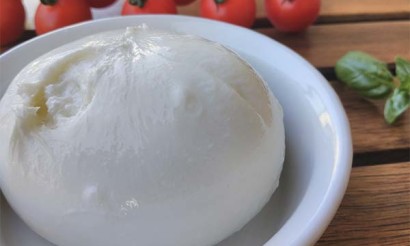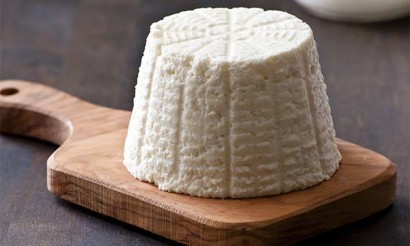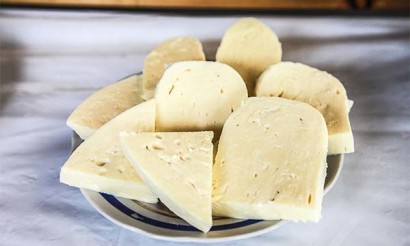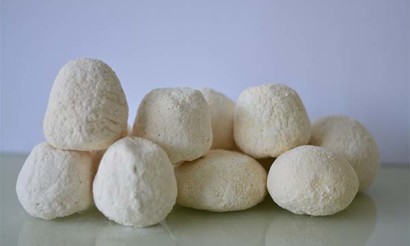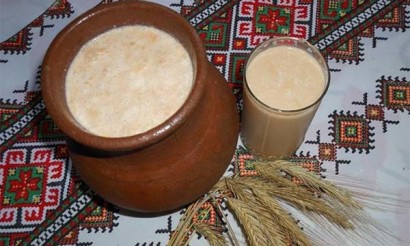Goat milk: useful properties and contraindications
Milk - a unique product, which is known to people since ancient times. The benefits of goat milk have long been known. It has not only an unusual pleasant taste, but also medicinal properties. This product is considered very useful, does not cause allergies, so it is often cooked on it for children, replacing cow's milk.
- In general about goat's milk
- What is the difference between goat's milk and cow's milk
- Which milk is healthier: cow or goat
- Composition and calories
- What is goat milk good for?
- General benefits
- For Women
- For Men
- While pregnant
- For breastfeeding
- For children
- Slimming
- The benefits of goat milk cheese
- Whey from goat milk: benefits and harms
- Usefulness of goat's milk whey
- Goat milk in medicine
- Diabetes Care
- Pancreatitis
- Gastritis
- For the Intestines
- For constipation
- For gout
- For colitis
- For the liver
- For hemorrhoids
- For cholecystitis
- Allergies
- For coughs
- Goat milk in cosmetology
- For Face
- For hair
- For the Body
- Harm and Contraindications
- Can goat milk be allergic?
- How to choose and store
- Can it be frozen?
- How to drink goat milk correctly
- How much can I drink per day?
- Can I drink it at bedtime and on an empty stomach?
- Should it be boiled?
- What can be made from goat milk: Recipes
- Cheese
- Cheese
- Butter
- Ice Cream
- Sour cream
- Yogurt
- Condensed milk
- Kefir
- Sour milk
- Pancakes
- Porridge
- Can animals be given goat's milk
- Interesting facts about goat milk
General facts about goat's milk
The goat is a domestic animal that belongs to the cloven-hoofed animals. It is one of the first animals that were domesticated. The products that goats produce are milk, meat, wool, and skin.
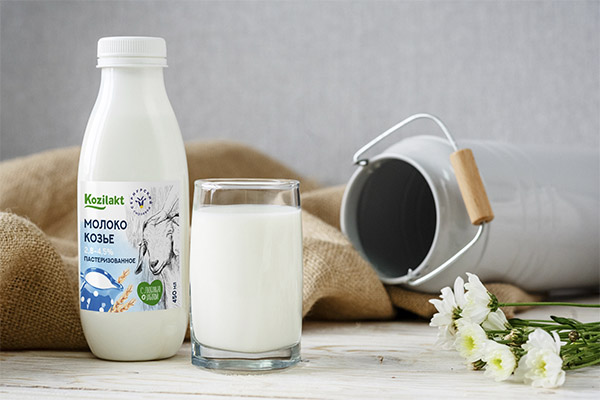
It is a rather unpretentious animal, which does not need huge pastures and the best meadows. It feeds on many kinds of different herbs, including yarrow, celandine, and others. These plants are officially considered medicinal. Due to these herbs, milk is enriched with an additional portion of useful elements.
What is the difference between goat's milk and cow's milk
The International Dairy Federation estimates that 750 million tons of milk were produced in 2018. In first place is cow milk, about 700 million tons, with goat milk in second place, about 15 million tons. The remaining 35 million tons came from mare, camel and other species.
Which milk is healthier: cow or goat milk
The question of which milk is healthier, cow's or goat's milk, has been asked for decades. Each milk is useful in its own way. And in order to understand which is better, it is necessary to compare the main indicators - their composition, benefits, availability and price, as well as other data.
Vitamins
The vitamin composition of both types is different. Both contain vitamins C, D, E, H in equal amounts.
Goat's:
- 25% more vitamin B6, which is beneficial to the immune system, nervous system and cellular repair (regeneration).
- 47% more retinol, aka vitamin A, which boosts vision and immunity.
In cow's:
- 5 times more vitamin B12. Improves brain activity, helps produce energy, increases hematopoiesis.
- Vitamin B9 (folic acid) is 10 times more. Increases mental stability, reduces the risk of heart attack, stroke, vascular problems.
Fat content of milk
The total fat content of the two varieties fluctuates on the same line, it is about 3-4% fat content. But they are different in their composition. When looking at the molecular structure, one clear difference can be noted - the globules of fat (that's the scientific term) that are present in milk.
In goat's milk, the fat has a smaller diameter and is distributed evenly throughout the volume. In cow's milk, the fat globules are larger in diameter and collect on the surface because of their structure. This means that the product is absorbed differently. The smaller the globules, the easier it is for the body to digest the product.
Protein
As you know, milk is a high-protein product. Protein is not the same thing as protein. There are plant proteins and animal proteins. Milk refers to animal proteins. And the structure of the protein of cow and goat products are different. The latter is much easier to digest.
Allergic reactions
It is generally believed that goat milk causes absolutely no allergic reactions. In fact, it's impossible. Any product can cause allergies, but some can cause allergies in only one case out of a hundred.
Minerals
The total composition of minerals is almost the same. Their share is 0.8-10% of the total chemical composition. But goat's milk has several advantages, a larger amount of some minerals.
- Selenium - an antioxidant.
- Potassium - is responsible for normalizing the cardiovascular system.
- Calcium - improves the condition of teeth, bones, hair.
- Phosphorus - supports cellular activity, eliminates the accumulation of toxic substances in the body by normalizing the kidneys.
Organoleptic properties.
This intricate word refers to the properties of a product that we can determine through the senses. In other words - smell, color, taste, appearance. Both types depend solely on the conditions under which the animal is kept. A clean animal is clean, tasty, beautiful and odorless milk.
Affordability and price
Clearly, cow's milk can be found on the shelf of any grocery store at a small and affordable price.
In the former CIS countries, it is almost impossible to find goat's milk in the store, and the price per liter is about 2-3 times more expensive than cow's milk.
To summarize, it is safe to say that goat milk wins on almost all counts due to its unique composition. Its nutritional value and properties speak for themselves.
Composition and calories
The chemical composition of milk is rich in vitamins, minerals, micro- and macronutrients, to name a few.
Vitamins:
- A;
- B (B1, B2, B3, B6, B9, B12);
- C;
- D;
- E;
- H;
- PP.
Minerals:
- Potassium;
- Calcium;
- Magnesium;
- Sodium;
- Phosphorus;
- Iron;
- Copper;
- Manganese;
- Silicon.
Other constituents:
- Phosphates;
- Proteins;
- Fats;
- Carbohydrates;
- Choline;
- Lecithin;
- Albumin;
- Globulin;
- Biotin.
Each of these elements is responsible for many processes in the body and has a beneficial effect on its vital functions.
The nutritional value of the product directly depends on many factors, so it does not have constant numbers. The best quality milk is always taken as the standard. The quality is directly dependent on many factors:
- Breed of goat (dairy, meat).
- Age (with age, the amount of useful enzymes decreases).
- Health (presence of diseases, recovery period, etc.).
- Lactation period (in dairy breeds, the duration of this period is up to 11 months).
- Conditions of housing (cleanliness of the room, hygienic treatment).
- Place of grazing (abundance of nutritious grass for goats, cleanliness of fields, availability of watering places).
100 ml of goat milk contains:
- Calories: 69.
- Protein: 3 g.
- Fats: 4,2 g.
- Carbohydrates: 4,5 г.
Percentage of FWS: 17%, 56%, 26%.
What is goat milk good for?
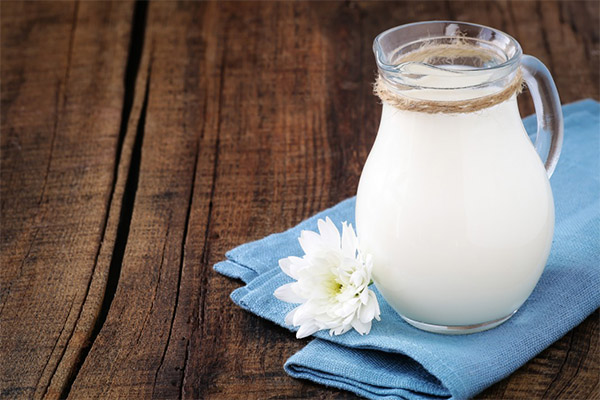
General benefits
- Due to the unique protein - casein - is much easier to digest than any other. It does not cause gastrointestinal disorders, allergies and is similar to breast milk in composition.
- Normalizes all metabolic processes in the body, beneficial effects on the hematopoietic organs.
- Restores the function of the gastrointestinal tract, strengthens the immune system.
- Due to the rich vitamin complex helps to fight faster against colds and viral diseases. And use in the fall and spring prevent avitaminosis.
- Solves the problem of insomnia.
- It is actively used in the treatment of tuberculosis and diabetes.
For women
- A large amount of biologically active substances (albumin, biotin, etc.) helps smooth expression lines and wrinkles, slows down aging, improves skin elasticity and smoothness, and normalizes the color of the skin.
- It helps restore hair damaged after chemical dyes, strengthens the nail plate.
- Scientists have long proved that women are prone to various thyroid diseases much more often than men. When consumed regularly, goat's milk helps cure or prevent the development of such pathologies.
For men
- Men who participate in various strength sports have noted an increase in muscle endurance when milk is used as a source of protein. It helps to rebuild muscles.
- The amazing composition of this product helps to avoid prostatitis problems after the age of 30. The active acids reduce the risk of developing an inflammatory process. Goat milk also prevents the development of male gland cancer, so it is actively taken for prevention.
- It increases male potency, increases the duration of intercourse, improves the quality of ejaculate, activates male cells to be able to fertilize the female egg.
- Another benefit of milk is the recovery of the body after drinking alcohol. It restores tryptophan and amino acids, which are leached from the body, envelopes the mucous membrane of the stomach and improves its microflora.
In pregnancy
Every second pregnant woman is diagnosed with gestational diabetes. It is goat milk that helps the body restore normal pancreatic and intestinal function, reduces the amount of cholesterol deposits.
It is scientifically proven that regular consumption of milk reduces the risk of depression and has a positive effect on the psychological state, which is especially useful for pregnant women with permanent hormonal surges.
When breastfeeding
Healing drink for breastfeeding mothers is a treasure trove of useful substances for the little baby. Milk will help the recently born mother to cope with possible postpartum depression without harming the health of the baby.
For kids
- Regular consumption of the product has a positive effect on the condition of teeth and bones in children.
- Milk helps reduce the risk of rickets in children with low calcium and vitamin D levels in the body. It is recommended to be consumed with breast milk or formula.
- Goat's milk-based infant formula is suitable for babies with allergies of various etiologies. Children who drink goat milk become ill less frequently and recover twice as quickly due to its ability to thin sputum and expel it from the bronchi.
- The product reduces allergic reactions, develops intelligence, improves brain activity, gives energy, and helps overall development.
For weight loss.
The energy value of the product is high and the caloric value is quite low, averaging 96-98 kcal per 100 grams. Therefore, milk can be actively used both for weight loss and for the prevention of weight gain.
The fat content of milk is 4.4%, which means that it is quickly digested. The surplus, which can be deposited as fat deposits, is quickly eliminated from the body.
A large amount of protein has a positive effect on the breakdown of fat and muscle growth, and normalizes the metabolism. A good metabolism is a fast weight loss. The product brings a long feeling of satiety, even in small portions.
The benefits of goat's milk cheese
Despite the fact that goat cheese was made more than 11 thousand years ago, the first to learn about the nutritional properties of this product was nomadic people. People noticed that fermented milk forms balls, which later began to be squeezed and pressed. The product is well satiated, as well as changing the state of the body for the better. The active transition of the population to proper nutrition made many people think about the benefits of goat cheese. Its nutritional properties are now known around the world.
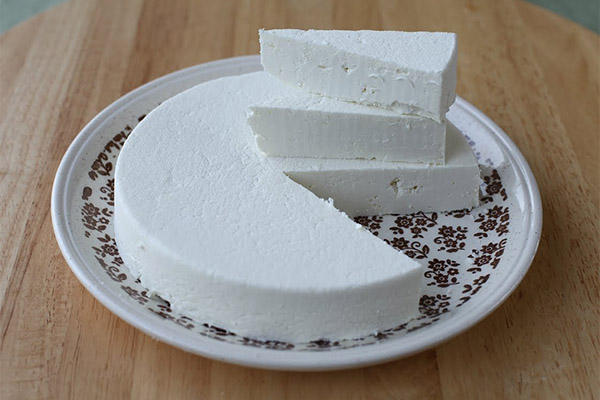
- Low fat percentage. Everyone knows that cheese made from cow's milk is quite a fatty product. Goat cheese is an alternative to cow's cheese. The use of this product will help reduce the intake of saturated fats and "bad" cholesterol in the body.
- Low calories. Goat milk is a low calorie product. Therefore, replacing the usual cheese with goat milk, you can safely subtract 300-400 kcal from your daily calorie intake. This is practically a whole meal.
- Lactose. Such cheese can be eaten by people with lactose intolerance. As part of the goat's milk, the amount of lactose is many times less than in the usual, cow's milk. When making cheese, or rather shaking it, the lactose is displaced. Therefore, as a result, goat cheese contains a minimal amount of the intolerant substance.
- Protein. In terms of protein, goat's cheese loses out to cow's cheese. But the quality of the protein overshadows this fact. It is easy to digest, normalizes cellular metabolism in the body, gives satiety that lasts longer, for example, than after cheddar cheese. Such a product is an ideal source of protein for athletes who adhere to a certain dietary regime, as well as well suited for pregnant women and women during lactation.
- Nutritional value. The content of vitamins and minerals in goat cheese is high. When processing milk into cheese, the value of the product does not change. The consumption of even a small amount of cheese several times a week can give positive results. Vitamin D will strengthen bones and immunity, an abundance of calcium will contribute to the development of bones and teeth. B vitamins are responsible for the health of all kinds of tissues and the genital system.
Goat's milk cottage cheese: benefits and harms
One of the valuable foods is considered to be cottage cheese. Its nutritional value helps maintain the health of not only the gastrointestinal tract, but also the bone system and teeth. Cottage cheese is one of the common foods for weight loss, sports, gaining muscle mass and not only.
Thanks to a special technique of milk processing goats obtained useful, high quality and nutritious product. Its value is similar to meat in the amount of protein and amino acids. All this is made possible by the addition of a special kind of microorganisms. These organisms curdle the milk, which contributes to the settling of useful protein. Despite its similarity to meat, cottage cheese is not as caloric and is much easier to digest. Although the number of calories per 100 grams directly depends on the fat content of the milk from which it was made.
Useful properties of goat curd
A quality product always finds a use for itself. This is why goat's curd is used not only in cooking, but also in dietetics, cosmetology and various medical practices. The grainy white mass will not only satisfy hunger, but will also be a natural aide to the body in case of various ailments.
- It increases the immune response of the body, protecting it from colds, viruses and even some kinds of cancer.
- It has a beneficial effect on the digestive system and improves the state of intestinal microflora.
- Normalizes the condition of hair, nails, teeth, give them strength and a healthy look.
- Excellent for women suffering from thrush. As part of cottage cheese are substances that combat fungus. As has long been known, it is impossible to cure thrush forever. Including goat's milk curd in the diet, you can reduce the risk of developing the disease by 2-3 times.
- It helps reduce the amount of "bad cholesterol", frees blood vessels from plaques, reduces the development of atherosclerosis.
- Stimulates the work of the hematopoietic organs, normalizes blood circulation.
- Supports blood pressure and heart function.
- Reduces the risk of anemia.
- Has a large amount of folic acid, which is especially useful during the first trimester of pregnancy.
- A good helper in the production of the male hormone testosterone, due to the abundance of B vitamins, selenium and zinc.
- Helps build muscle for athletes thanks to protein enzymes.
The harm of goat's milk curd
We must not forget that a useful product should enter the body in limited quantities. An overabundance of cottage cheese is fraught with harm. The average daily rate for the body, which absorbs dairy products well, is 200 g. Otherwise you can only worsen the situation.
- Protein, especially casein protein, can not only help. Its overabundance can provoke the development of autoimmune diseases.
- Swelling can occur.
- Consumption of large amounts of fat can clog the liver ducts. The risk of developing liver or biliary colic increases.
- It should not be forgotten that cottage cheese is a protein product. People with allergies should try it in small portions, otherwise anaphylactic shock can develop.
- People with a serious lactose digestion disorder need to be extremely careful, otherwise the body may not accept cottage cheese even from goat milk.
Is goat's milk whey good for you?
Whey is the liquid that remains after the production of curd. Most often it is simply poured out. Some give it to feed livestock. Others are wise to use it wisely. It retains vitamins and minerals, a small amount of protein and fat. Its therapeutic properties have been talked about since ancient Greece. Today it is not so actively used.
The fermentation process is associated with the destruction of milk sugar and an increase in the acidic environment of the liquid. At this time, beneficial bacteria begin to develop in the milk liquid, which destroy pathological microflora.
The abundance of "good" bacteria is the lot of all dairy products. That is why doctors recommend that it be consumed. Since ancient times, whey has been used in folk medicine. It was actively used, and some continue to use it for a variety of serious diseases.
- Diseases of infectious nature (tuberculosis, jaundice).
- Pathologies of the digestive system.
- Skin diseases (eczema, dermatitis).
- Inflammations of the bladder.
- Presence of kidney stones.
- Microflora disorders.
- Various poisonings.
- Weakened immunity.
- Avitaminosis in different age groups.
The product is a good anabolic. It helps "build" muscles for athletes, cleanses the body of excess substances, gets rid of hemorrhoid symptoms when consumed on an empty stomach.
The rich composition, which contains a large amount of vitamin C, B, various trace elements, helps the body to recover faster after illnesses. The product is recommended for various nervous system overloads. It has a calming effect in stress and depression.
The daily norm of whey is about 200 ml. This amount is enough to stimulate the immune system, restore the work of the gastrointestinal tract.
Goat milk in medicine
Due to its unique composition and easy tolerability, goat milk is recommended to be introduced into the diet by medics. It began to be used in the ancient world. And to this day this product is in demand. Its nutritional value makes it suitable for people who are lactose intolerant, for those who have difficulty digesting protein, and even for allergy sufferers.
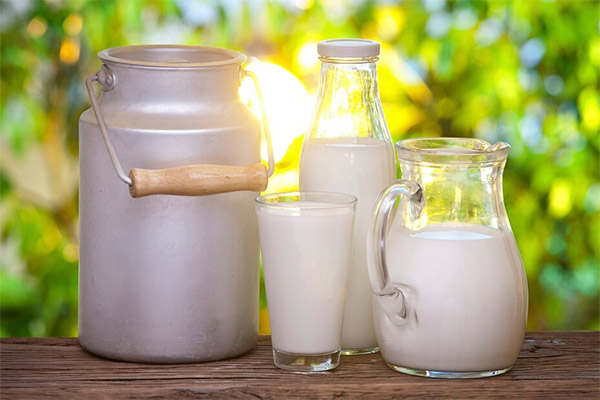
The large amount of potassium in the composition helps the cardiovascular system, speeds up the blood, restores the function of the hematopoietic organs. It is recommended for people with arterial hypertension and other diseases related to the circulatory system to drink it.
Avicenna, an ancient Persian scientist and healer, wrote that daily consumption of goat milk can protect people from senile dementia. It is also used for other purposes.
There is a popular belief that goat milk can save the body from cancer. Although there is no scientific research, but scientists have noted one advantage. If you consume milk during chemotherapy procedures, it reduces its negative effects on the body, and also helps the immune system recover faster.
For diabetes.
Goat milk has a low glycemic index (30). This means that it is able to raise blood sugar levels gradually, without creating a sharp release of insulin in the body. Regular use can reduce the symptoms of diabetes, provided that all the doctor's orders are followed.
For pancreatitis
Pancreatitis is an inflammation of the pancreas. Milk is good for relieving any inflammation in the body, for this it is enough to know how to drink it correctly. At risk of developing chronic pancreatitis, it is recommended to drink milk every day. It should be boiled before taking it. In the first 2 weeks of taking milk, it is better to dilute it with boiled water at a ratio of one to one. You should start with half a glass, gradually passing to a whole glass of milk.
With gastritis
The ability of milk to line the inner wall of the stomach with a protective film makes it indispensable for gastritis. It normalizes the level of acidity, regulates the work of the digestive glands. All this helps the stomach to react adequately to incoming food and digest it without additional stress. Milk is incapable of curing. But it is not difficult for milk to help and relieve unpleasant consequences.
For the intestines
The intestines are a treasure trove of various microorganisms that help not only to digest food and form stools, but are also responsible for the body's immune responses. Any disturbance in the microflora can be detrimental to health. Therefore, it is very important to monitor the condition of the intestines. Goat milk can help in this.
Its rich composition gives the body not only nutrients, but also beneficial bacteria. It helps to restore normal intestinal microflora, thereby strengthening the immune system.
For constipation
Stool formation is a serious process that takes place in the intestines. Lack of sufficient microorganisms contributes to constipation. Regular consumption of milk solves this problem by populating the intestines with bacteria. They normalize the processing of food and contribute to the proper formation of stools not only adults but also children.
In gout.
The disease involves the transition to a proper diet with many bans and restrictions. The amount of fats, proteins, carbohydrates is limited. The daily caloric intake is set according to a person's BMI. Goat milk, although it does not have many calories, is a source of many fats. Therefore, its use should begin under the supervision of a doctor and limit it to 100 ml per day.
In colitis
The use of cow's milk in colitis is fraught with abdominal bloating, the appearance of heaviness, so it is excluded from the diet. It is exactly the opposite in its effect on the body. Doctors recommend using only goat milk. Due to its composition, it has a positive effect on the gastrointestinal organs, relieves symptoms of colitis, and normalizes microflora.
For the liver
Milk rich in potassium has a beneficial effect on the organs of hematopoiesis. The liver is one of these organs. Consumption of milk helps to normalize the liver, it is prescribed for jaundice, cirrhosis, hepatitis. Phospholipids in milk help to strengthen the liver membrane and repair it. And many antioxidants help cleanse the organ that filters blood.
In hemorrhoids.
Taking goat milk is indicated for hemorrhoids, and it works especially well when consumed on an empty stomach before breakfast. Its anti-inflammatory properties help to reduce enlarged knots. In the presence of lactose intolerance, it is better to use milk whey.
In cholecystitis.
The positive effects of milk can also be noted for cholecystitis. Milk, with its rich composition, helps to reduce the risk of gallstones, relieves inflammation of the ducts. It helps to remove small crystals that can later form stones. Cholecystitis seriously lowers the body's immune response. The property of the product to strengthen the immune system will come in handy.
In case of allergies.
It is widely used for allergic reactions to cow's milk in children and adults. As has long been known, allergies are caused by a protein component. Goat's milk contains it in minimal amounts, so it is often used to feed babies of the first year of life. They replace cow's milk for people with lactose intolerance.
From coughs
Milk, thanks to its bactericidal properties, helps to get rid of colds and viral diseases in half the time. When coughing, it will help to remove phlegm from the bronchi, relieve inflammation of the throat, reduce the frequency of coughing, remove the pain of a dry cough. For this purpose, warm milk is drunk, with honey or soda added to improve the effect.
Milk with honey is drunk for bronchitis, coughs and colds.
Milk with soda is good for sore throats.
Goat milk in cosmetology
The use of goat's milk in cosmetology dates back to ancient times when Queen Cleopatra ruled. Her famous milk bath is still in great demand and success. The positive effects of milk on the face and hair are also noted.
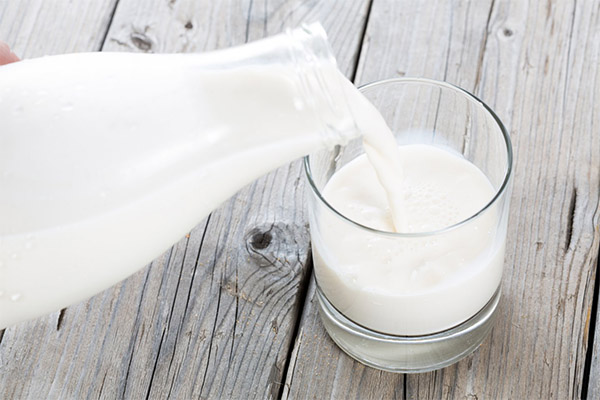
For Face
- Clay face masks are the most popular method of using milk. The recipe for such home care products is quite simple. It is necessary to choose a clay that corresponds to the type of skin, and dilute with warm milk. Apply the mask to the face and decollete area and leave it for half an hour. After rinsing with cool water without the use of additional products.
- Freeze cooled to room temperature goat's milk in ice molds. Wipe your face with ice cubes every evening before going to bed. The course is two weeks. Such ice has a lifting effect, smoothes fine lines and wrinkles, improves complexion.
Important: When used on a permanent basis, the ice will cease to work due to the effect of habituation. It is necessary to undergo a course of 2 weeks every 4-6 months.
For the hair
- Rinse with goat milk. To get a healthy shine and hair became stronger, it is worth using a simple method. You need to dilute goat milk and warm water in a ratio of one to one. Rinse your hair with the milk mixture every time after washing. The effect will be visible after 4-6 applications. Hair will receive vitamins and minerals, gain shine and become much stronger.
- Milk and oatmeal. For greasy hair, a mask based on goat's milk and oatmeal is ideal. Stir the ingredients until a homogeneous consistency of thick sour cream. Apply to the scalp and wrap with a terry towel. In 20 minutes you need to wash off with warm water.
For the body
To always make the skin happy, it needs timely and daily care. Various creams, lotions and other chemicals help, but today more and more often turn to folk beauty recipes for natural moisturizing and nourishing the skin.
Body peeling with goat's milk:
- Fine sugar - 1 cup.
- Goat milk - 4 tablespoons.
- Lemon juice - a couple of drops.
- Base oil - 3 tablespoons (olive, almond or coconut).
- Rose essential oil - a few drops.
All ingredients must be the same temperature. Mix everything in a bowl and without waiting for the sugar to melt, apply it to the skin. Massaging movements go over all areas of the skin, leave for 5 minutes and rinse thoroughly.
For a white bath you will need only 2 liters of goat milk and 100 grams of natural honey. Pour honey heated to no more than 40 degrees into the warm milk. Add this mixture to the bath with hot water. Duration of the procedure - no more than 40 minutes. Such a combination of milk and honey will give your skin a natural velvety softness.
Harm and contraindications
You should not think that goat milk is a cure-all solution. There is not a single product that is good for everyone at all times. Be sure to find a person with an allergy or intolerance to any component.
Possible harm and contraindications to the use of this product:
- The goat, despite its cleanliness, can chew everything in a row. Therefore, there is a risk that the animal may contract a common viral disease, brucellosis or pleural pneumonia. In very rare cases, it can be a carrier of encephalitis. Therefore, when consuming raw milk, you should make sure that the product is of good quality and the animal is healthy.
- Goat milk is often attributed unpleasant odors. This actually depends on the cleanliness of the goat's owners. The animal's glands give off unpleasant odors: if the udder was not treated before milking, the milk will also have this specific smell.
- If a child who is less than a year old is fed goat's milk, anemia can develop, because the milk lacks iron and contains a lot of calcium.
- Disaccharides in milk can adversely affect the health of the child in the form of diathesis. Because of the failure of the body disaccharides are not digested.
- Milk can taste quite unpleasant and leave a taste in the mouth. This happens if the animal is in the recovery stage after treatment. Or if he was injected with antibiotic drugs.
- You should not forget about lactose, although goat's milk has less of it. But it is still present and can cause indigestion, flatulence and other problems.
- Goat milk is contraindicated for liquid stool problems, as it contains substances that are laxative and can cause more serious consequences.
- Large amounts of protein are dangerous to consume for people with kidney failure.
Can you be allergic to goat milk
Doctors often make the diagnosis "cow protein allergy." This means that a child or adult cannot consume any dairy products without harm to health. Many people are saved by switching to goat milk. But it also contains a protein that can cause allergic reactions. The difference is that the manifestation of allergy to this protein occurs in 1 case out of 1,000. Therefore, it is considered hypoallergenic.
We should not forget that there is no product that does not cause allergies. Any product can cause allergies and have serious consequences. Therefore, if you are allergic to cow's milk goat milk should be tried with extreme caution.
How to choose and store
Goat's milk is much harder to find than cow's milk. It is quite a specific product. When buying it, you should focus on two main indicators.
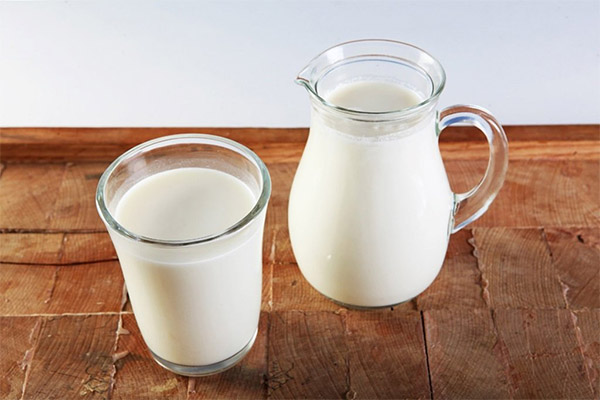
- Smell. Good, clean milk should not contain extraneous odors. If the owners monitor the hygiene of the animal, its diet, then, accordingly, the milk will not have a specific aroma.
- Color. Fresh milk will be white in color, without yellowing or other shades. The yellow shade means that the product is not the first fresh milk, and it is not worth buying it. It can be very harmful to your health.
How to Store
Different milk is stored for different lengths of time. Goat milk is known to have a long shelf life, even at warm temperatures. But it is recommended to store it only in the refrigerator.
- Milk that has been boiled will keep in the refrigerator for 10 days.
- Fresh (raw) milk - no more than 5 days.
This difference is due to the fact that in the boiled milk live bacteria are killed, and the shelf life increases. But the benefits will be different. For example, for the microflora of the gastrointestinal tract it will be more appropriate to drink steamed milk.
Can we freeze it?
When freezing milk, its useful properties are not lost, but preserved. The necessary bacteria do not die, but go into "hibernation". But you should not use this method often. Milk of different freshness will not stand the same. Frozen is recommended to store no more than two weeks.
How to drink goat's milk correctly
Goat's milk is much fatter than cow's milk, so it is advised to dilute it with water in the proportion 1 to 1.
When introducing milk into the diet of infants, you should be extremely careful. You should not introduce it before 6 months of age. The first few days it is better to give boiled and diluted milk in a ratio of 3:1, after 2-3 days to change the ratio to 2:1, and then to 1:1. You can boil children porridges with milk or dilute milk formula with it.
Adults, introducing goat milk into the diet, too, must exercise caution, because it can cause a backlash. And the use in large quantities negatively affects the pancreas.
How much you can drink per day
To assimilate all the necessary substances, you should not consume more than 200 ml of pure milk per day. This is about 2 glasses if diluted with boiled water. The fat content of the product can negatively affect the liver and other organs.
Can you drink it at night and on an empty stomach?
For gastrointestinal problems, for hemorrhoids, during treatment - these are the three main situations when milk can and even should be drunk on an empty stomach. The main rule is that the milk must not be cold. It should either be heated or put in a warm place beforehand.
You should not drink milk at night just to satisfy hunger. The body needs a lot of energy to assimilate and digest food and liquids. The exception is sore throat or other colds and viral diseases. A warm glass of milk with supplements can help you sleep better, relieve pain and reduce coughing attacks.
Does it need to be boiled?
Milk is boiled to disinfect it. This is especially important when introducing it to a child's diet. It is not necessary to boil milk only if it is necessary to restore the intestinal microflora of an adult, and there is full confidence that the animal that gave it, absolutely healthy.
What can be cooked from goat milk: recipes
The uniqueness of goat's milk is that with various manipulations, the amount of lactose in the finished product is reduced many times. Therefore, goat milk is a lifesaver for lovers of dairy products.
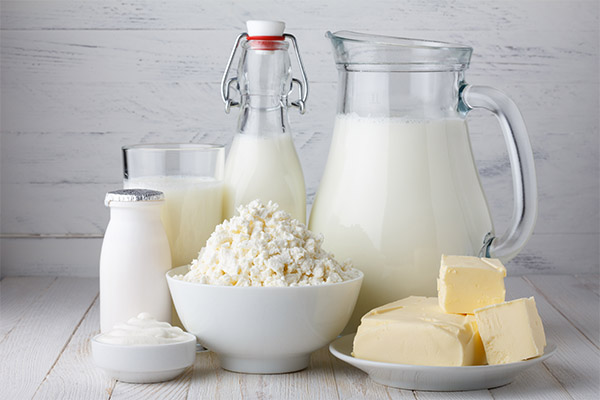
Cheese
You will need:
- 1 kg of cottage cheese (store-bought or homemade);
- 1 chicken egg;
- 3 liters of goat milk;
- 12 grams of soda;
- pinch of salt;
- 100 ml vegetable oil.
How to prepare:
- Strain and boil the milk. Then add the cottage cheese. Cook over low heat for about 20 minutes.
- Put the mass on a colander to get rid of the liquid.
- Then put it all in a bowl and mix in the egg and baking soda. Then add the oil and salt.
- Then send the bowl to a water bath for 10 minutes after the water has boiled.
- Actually ready cheese put tightly in a plastic bottle (in it the top is cut off beforehand). Send the container to the refrigerator until it cools.
Cottage cheese
Recipe 1
You will need:
- 1 liter of milk;
- 3 pinches of salt (regular - table salt).
How to prepare:
- Boil the milk and add a little salt to it for faster fermentation. Cover the pot with a lid and leave it in a warm place for 24 hours.
- Put the fermented milk on a low heat to heat (do not boil).
- In a deep bowl put a colander and cover with gauze, previously folded in several layers.
- Pour the sour warm milk into the colander. Then suspend the gauze so that all the residual liquid drains out. The remainder in the gauze is your finished cottage cheese.
Recipe 2
Take half a liter of goat's milk, heat it in a water bath and leave it to ferment for two days. To speed up the process of fermentation of the milk, you can add 1 tbsp. sour cream. As soon as air bubbles become visible (the formation of sour milk), put the jar on a water bath and again heated over low heat for 15 minutes. Then strain the mass with a colander, covered with gauze. Bag with cottage cheese to hang in a suitable place for 8 hours.
Butter
For 110 g of the product you will need:
- 1.8 liters of milk;
- 1 tbsp of kefir.
How to prepare:
- Keep the milk in the refrigerator for 2 days.
- Use a scoop to collect the cream from the top.
- Then carefully pour them into a sterilized jar with a lid. Then add the kefir.
- Put the mass in a warm place for 5-12 hours.
- Then cool the mass in an ice bath.
- Shake a closed jar thoroughly to whip the mass. You can use a blender.
- Then put a muslin napkin in a colander and put the milk mass on it. The butter will remain directly on it.
Ice cream .
You will need the following products:
- Goat milk - 500 ml.
- Sugar - 50 gr.
- Starch - 2 tsp.
- Honey - 3 tbsp.
- yolks - 5 ears.
Preparation process:
- Bring goat's milk to a boil.
- While the milk is heating in a separate bowl, whisk the yolks with the sugar and add the starch.
- Thinly pour the yolk-sugar mixture into the milk and stir until the mass doubles in size.
- Pour into the ice-cream moulds, allow to cool to room temperature, add honey and set in the freezer until it has hardened.
- The ice cream is ready. Can be served with a variety of fruits and syrups.
Sour cream
It is required to prepare 3 liters of milk. Put the jar with it in the refrigerator, so that the cream rises to the top. At the end of 2 days remove them with a tablespoon. The cream should sour at room temperature. When ready, place them in the refrigerator for 1.5 days.
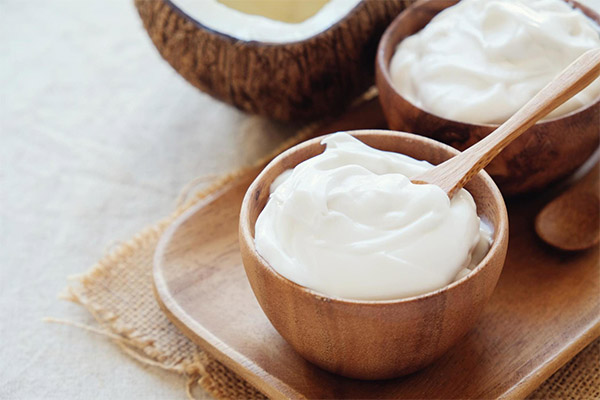
You can also make sour cream using a sourdough starter. Heat the cream with 20% fat to 37-38 degrees. Then add 2 spoons of homemade sour cream. Cover the pot with a plaid, it should stand in the heat for 7-9 hours. Stir the mass is not allowed. After this time put the pot in the fridge - the mass will thicken after it has cooled.
Yogurt
To make yogurt, you will need:
- Goat's milk - 2-3 liters.
- Starter for yogurt.
The process of preparation:
- Boil the milk for one minute.
- Pour into a glass container and cool to a temperature of 38-40 degrees.
- Pour in the prepared sourdough starter and stir.
- Pour the milk into a thermos, cover and leave at 22-25 degrees for 8 hours.
- After this time, pour into a glass container and put in the refrigerator for 2-3 hours.
- Yogurt is ready for use.
Condensed milk .
For the preparation will need:
- Milk - 300 ml.
- Powdered sugar - 300 gr.
- Butter - 30 gr.
Cooking process:
- Mix all the ingredients in a thick-bottomed saucepan.
- Place on low heat and cook until a film appears, stirring constantly.
- After the membrane appears, add heat and after boiling, cook for another 10 minutes stirring constantly.
- Then pour into a bowl and put in a cold water bath until it cools. The milk will thicken and become a delicious condensed milk.
Kefir
Getting kefir from goat's milk is simple enough.
You need to prepare the following components:
- Goat milk - 2-3 liters.
- Sourdough purchased (or you can take kefir 2,5% - 2 tablespoons).
Preparation process:
- Put the pot on low heat. Pour in the milk and bring to a boil.
- As soon as the milk boils, immediately turn off and leave to cool to 38-40 degrees (about 40 minutes).
- Add the starter or kefir and cover.
- Leave the milk and kefir at room temperature for 6 hours.
- When ready keep it in the refrigerator.
Sourdough
It is better to purchase pre-made lactobacillus to make sourdough.
Products:
- Goat's milk - 5 liters.
- Lactobacillus.
- Bulgarian bacillus.
Preparation process:
- Boil the milk.
- Introduce both types of bacteria into warm milk (when it will be 38-40 degrees) (the number of bacteria per liter of milk is listed on the package, different companies have different amounts).
- Mix well and whisk the milk.
- Pour into storage jars.
- Leave to mature at room temperature for 8-10 hours.
Pancakes .
Before making pancakes, it is necessary to prepare all the ingredients in advance, so that they are the same temperature.
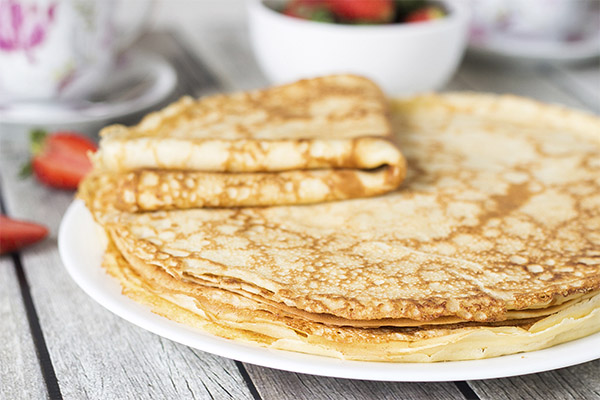
Components:
- Goat milk - 300-400 ml.
- Flour of the highest grade - 250 gr.
- Sugar - 100 gr.
- Salt - ½ tsp.
- Eggs - 2 pcs.
- Melted butter - 1 tablespoon.
Preparation process:
- Add the eggs, sugar and salt to the milk, whip everything well with a whisk until smooth.
- Add the melted butter.
- Gradually add flour and stir until the consistency of sour cream.
- You can bake pancakes.
- Heat a pan and grease it with vegetable oil.
- Pour a little batter in thin streams and bake for about one minute over a low heat.
- Flip the pancake over and bake on the second side until beautifully golden.
- Layer the pancakes on a plate and brush each one with butter as desired.
Ready to make delicious, hearty and healthy pancakes!
Porridge
Rice porridge with goat's milk is one of the most delicious and healthy.
Ingredients:
- Barakat rice - 200 gr.
- Goat milk - 600 ml.
- Water - 250 ml.
- Salt and sugar - to taste.
- Butter - 30 gr.
Cooking process:
- Wash the rice and place it in the bottom of a saucepan. Pour cold water and put to boil.
- Once the rice has absorbed the water, add half of the milk and continue to cook over low heat.
- When the rice is almost cooked, add salt and sugar. Add more milk and simmer for about 5 minutes.
- When the porridge has thickened, add the rest of the milk, stir and cover for 5-7 minutes.
- Add butter to the cooked porridge and serve.
Can we give goat's milk to animals?
Scientists have proven that mammals do not always need the milk of other animal species. Very often milk can disrupt the gastrointestinal tract, causing allergies. Cats often have lactose intolerance.
It is unnecessary to feed goat's milk to animals if the pet's diet is varied. Milk can be given diluted with water (1:1) to pets, but in small amounts.
Interesting facts about goat milk
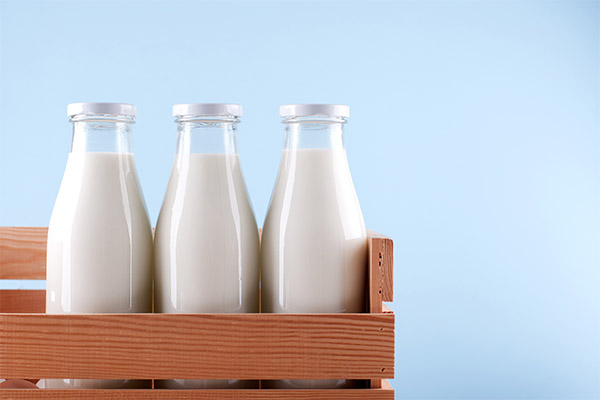
- If the goat eats fresh carrots and apples every day in small quantities, the taste of the milk changes. The tartness that many people don't like disappears.
- The Anglo-Nubian goat breed gives milk that naturally has a frothy taste with a slight flavor of nutmeg and nutmeg. Such milk is odorless.
- When a child reaches age 7, the enzymes that break down milk are no longer produced. But in countries where many generations consume goat milk throughout life, these enzymes are produced regardless of age.
- The goat is an animal that can eat almost anything it can chew. Once in Belgrade, a goat ate 20,000 euros in cash from the owners' table.
- Many pharaohs ordered goat cheese heads to be placed with various jewels inside their tombs.
«Important: All information on this site is provided for informational purposes only purposes only. Before applying any recommendations, consult a health care professional. specialist. Neither the editors nor the authors shall be liable for any possible harm caused by materials."

